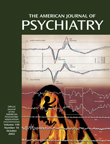A Randomized Trial of Sertraline as a Cessation Aid for Smokers With a History of Major Depression
Abstract
OBJECTIVE: Evidence that major depression can be a significant hindrance to smoking cessation prompted this examination of the usefulness of sertraline as a cessation aid for smokers with a history of major depression. Specifically, sertraline’s efficacy for smoking abstinence and its effects on withdrawal symptoms were evaluated. METHOD: The study design included a 1-week placebo washout, a 9-week double-blind, placebo-controlled treatment phase followed by a 9-day taper period, and a 6-month drug-free follow-up. One hundred thirty-four smokers with a history of major depression were randomly assigned to receive sertraline (N=68) or matching placebo (N=66); all received intensive individual cessation counseling during nine clinic visits. RESULTS: Sertraline treatment produced a lower total withdrawal symptom score and less irritability, anxiety, craving, and restlessness than placebo. However, the abstinence rates did not significantly differ between treatment groups: 28.8% (19 of 66) for placebo and 33.8% (23 of 68) for sertraline at the end of treatment and 16.7% (11 of 66) for placebo and 11.8% (eight of 68) for sertraline at the 6-month follow-up. No moderating effects of single or recurrent major depression, depressed mood at baseline, nicotine dependence level, or gender were observed. CONCLUSIONS: Sertraline did not add to the efficacy of an intensive individual counseling program in a double-blind, placebo-controlled study. However, given that the end-of-treatment abstinence rate for the placebo group was much higher than expected, it is unclear whether a ceiling effect of the high level of psychological intervention received by all subjects prevented an adequate test of sertraline.



